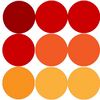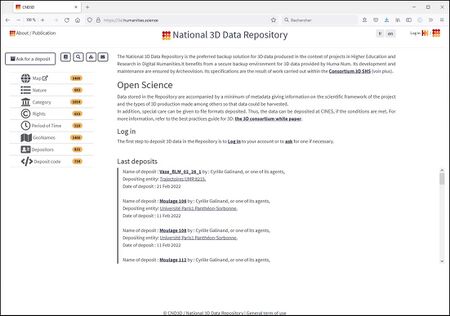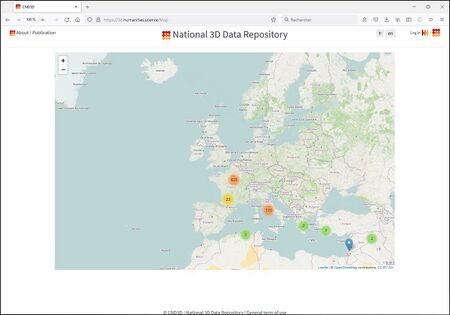Difference between revisions of "CND3D"
Jump to navigation
Jump to search
| Line 63: | Line 63: | ||
== Further Information == | == Further Information == | ||
| − | * https://hal.archives-ouvertes.fr/hal-03267055 | + | * Sarah Tournon, Vincent Baillet, Mehdi Chayani, Bruno Dutailly, Xavier Granier, et al.. The French National 3D Data Repository for Humanities: Features, Feedback and Open Questions. Computer Applications and Quantitative Methods in Archaeology (CAA) 2021, Jun 2021, Lymassol, Cyprus (virtual), France. ⟨[https://hal.archives-ouvertes.fr/hal-03267055 hal-03267055]⟩ |
Revision as of 15:40, 22 February 2022
Description
The French National 3D Data Repository (aka CND3D) is an intitutionnal repository to preserve 3D data produced in Digital Humanities Research.
The CND3D tool is used to make deposits of 3D objects.
Features
- Creation of deposit with its metadata
- Creation of 3D object information with metadata inside a deposit
- oNLINE Enrichment of 3D object metadata with interoperable thesaurus tag of PACTOLS' frantiq
- DOI assignement on each deposit
- DOI assignement on each 3D object
- Creation of collection of 3D objects with reusable url for example La technothèque
- Cross referencement of 3D objects or deposit with any HAL publication
Videos Demonstration
| Demonstration | Link |
|---|---|
| Video 1: main features | https://bit.ly/35jRuqP |
| Video 2: Semantic enrichment | https://bit.ly/3v6Uv8O |
User Experiences
Nearly 40 depositing entities had been registred in the CND3D.
More than 400 deposit are stored in the CND3D containing 1400 3D objects.
Massive deposits are made using aLTAG3D packages
Some user prefer to make deposit with the web interface
Almost 2To of data are stored in the 3D Data Repository, more than 10To have been requested for the last 2 years.
Development activity
Further Information
- Sarah Tournon, Vincent Baillet, Mehdi Chayani, Bruno Dutailly, Xavier Granier, et al.. The French National 3D Data Repository for Humanities: Features, Feedback and Open Questions. Computer Applications and Quantitative Methods in Archaeology (CAA) 2021, Jun 2021, Lymassol, Cyprus (virtual), France. ⟨hal-03267055⟩



